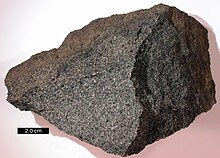Gabbro
Appearance




Gabbro is a large group of dark, coarse-grained, igneous rocks. They are chemically equivalent to basalt. The rocks are plutonic, formed when molten magma is trapped under the Earth's surface and cools into a crystalline mass.
Most of the Earth's surface has gabbro in the oceanic crust, produced by basalt magmatism at mid-ocean ridges. In general, when the gabbro is formed, it lies above the Earth's mantle, and below the basalt.
Gabbro is generally coarse grained, with crystals in the size range of 1 mm or greater. It is an essential part of the oceanic crust. Long belts of gabbro intrusions[1] are typically formed at proto-rift zones and around ancient rift zone margins.
Notes
[change | change source]- ↑ Intrusion: pushed its way between other rocks
